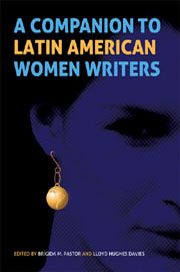Book contents
- Frontmatter
- Contents
- Introduction: The Feminine Voice in Latin American Literature
- 1 Sor Juana Inés de la Cruz (1648/51?–1695)
- 2 Gertrudis Gómez de Avellaneda (1814–1873)
- 3 Gabriela Mistral (1889–1957)
- 4 Alfonsina Storni (1892–1938)
- 5 Silvina Ocampo (1903–1993)
- 6 Clarice Lispector (1920–1977)
- 7 Rosario Castellanos (1925–1974)
- 8 Elena Poniatowska (1933– )
- 9 Alejandra Pizarnik (1936–1972)
- 10 Luisa Valenzuela (1938– )
- 11 Isabel Allende (1942– )
- 12 Rosario Ferré (1938– )
- 13 Laura Esquivel (1950– )
- 14 Laura Restrepo (1950– )
- Conclusion
- Bibliography
- Index
12 - Rosario Ferré (1938– )
Published online by Cambridge University Press: 05 February 2013
- Frontmatter
- Contents
- Introduction: The Feminine Voice in Latin American Literature
- 1 Sor Juana Inés de la Cruz (1648/51?–1695)
- 2 Gertrudis Gómez de Avellaneda (1814–1873)
- 3 Gabriela Mistral (1889–1957)
- 4 Alfonsina Storni (1892–1938)
- 5 Silvina Ocampo (1903–1993)
- 6 Clarice Lispector (1920–1977)
- 7 Rosario Castellanos (1925–1974)
- 8 Elena Poniatowska (1933– )
- 9 Alejandra Pizarnik (1936–1972)
- 10 Luisa Valenzuela (1938– )
- 11 Isabel Allende (1942– )
- 12 Rosario Ferré (1938– )
- 13 Laura Esquivel (1950– )
- 14 Laura Restrepo (1950– )
- Conclusion
- Bibliography
- Index
Summary
The Puerto Rican Rosario Ferré (b. 1938) has been a prolific writer since the 1970s, producing works in both Spanish and English. Ferré has written children's stories, such as El medio pollito (1976) [The Half Chick], Los cuentos de Juan Bobo (1980) [The Stories of Juan Bobo], and La mona que le pisaron la cola (1981) [The Monkey Who Had Her Tail Stepped On]. Her short stories for adults, included in Papeles de Pandora (1976) [The Youngest Doll] and Maldito amor (1986) [Sweet Diamond Dust], are famous for their treatment of women as doubled by dolls, statues, monsters, offspring, and other women. Ferré's book of poems, Fábulas de la garza desangrada [Fables of the Bled Heron] appeared in 1982. In the second half of the 1990s, she produced acclaimed novels, The House on the Lagoon (finalist for the National Book Award in 1995, with a later Spanish version, La casa de la laguna) and Eccentric Neighborhoods (1998; Spanish version, Vecindarios excéntricos, 1999). These last two works fit into a tradition of archival-novels-dealing-with-marvellous-Latin-American-realities, in the style of Gabriel García Márquez, Mario Vargas Llosa (a former professor of Ferré's at the University of Puerto Rico), and Isabel Allende. In the recent works, Ferré remains preoccupied with Puerto Rico, mothers and daughters, women as readers and writers, and the establishment of (female) individual identity in the face of social hierarchies and class distinctions: hence Patricia Hart's description of Ferré as a ‘magic feminist’ (1991: 597–98).
- Type
- Chapter
- Information
- A Companion to Latin American Women Writers , pp. 169 - 182Publisher: Boydell & BrewerPrint publication year: 2012

